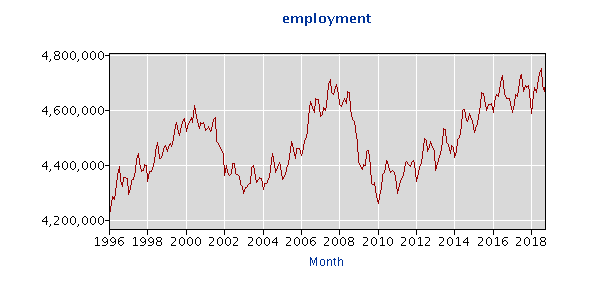My Tuesday blog post included the Pulsenomics outlook for 22 metro areas for 2019 and the Chicago area real estate market came in dead last. This seems to be a pattern. The Chicago area consistently comes in near the bottom of the 20 areas tracked by Case Shiller for one year home price appreciation. And about 2 weeks ago Realtor.com also placed the Chicago area dead last in their outlook for 2019 home price appreciation – among the largest 100 metros. It’s pretty sad.
So what’s going on here? There appear to be several recurring themes: taxes/ financial situation, economic prospects, and concern about the schools and crime. Back in March Crain’s Dennis Rodkin attributed the problem to slow employment growth, which drives population loss, and high taxes. In fact, the day after I first posted this Crain’s ran another story about how the Chicago metro area is losing 156 residents each day. Illinois Policy pretty much echoes the story about outmigration but they also point out that Cook County property taxes have risen 76% faster than home values and that Illinoisans have the second highest rate in the nation. They also beat the drum about Illinois raising the income tax to 4.95% in 2017.
Keep in mind that Illinois Policy has an anti-tax bias. While I think they might have a point about property taxes please note that the property tax situation varies widely across Illinois and even within Cook County. Many of the suburbs are hit much worse than Chicago. As for their point about income taxes…I probably hate income taxes more than the average person but they are being a bit disingenuous. That income tax increase was a reversal of an earlier tax cut and 4.95% is not that high relative to many states across the nation. Maybe they should have brought up the sales tax which, for Chicago at 10.25%, is pretty damn high.
Regarding the economic prospects for the metro area…I track the metro area employment numbers and they are actually pretty good. We have hit an all time high in employment, having added more than 446,000 jobs since the depths of the recession, and we are ahead of this time last year by 23,000 jobs.

I believe that the economic prospects are actually fine overall but there is in fact a world of difference between the higher income and lower income opportunities. Consequently, the outmigration is occurring primarily among lower income folks.
And therein lies the missing part of this story. Everyone is talking about the metro area as a whole when, in fact, it is comprised of a multitude of smaller submarkets. The negative performance of the overall market buries the fact that there are some areas that are doing really well while there are others doing very poorly. Just take a look at the price trends graph in the middle of my post on The Ultimate Guide To The Chicago Area’s Hottest Neighborhoods. That post is due for an update but the graph auto updates. There is a dramatic difference between the price appreciation of West Town/ Near West Side and Calumet City/ Harvey. Some of the southern suburbs are in a death spiral. Even some of the northern suburbs are struggling with home sales as demographic, economic, and cultural changes impact where people want to live.
So maybe the “Chicago area” isn’t doing as badly as everyone thinks – just some areas. The reality is that the universe is a very dynamic place. Things change and they don’t change uniformly. Unfortunately, politicians hate the way the universe works. So they will expend a lot of energy trying to fight it. In the end the universe will win.
#ChicagoHomePrices
Gary Lucido is the President of Lucid Realty, the Chicago area’s full service real estate brokerage that offers home buyer rebates and discount commissions. If you want to keep up to date on the Chicago real estate market, get an insider’s view of the seamy underbelly of the real estate industry, or you just think he’s the next Kurt Vonnegut you can Subscribe to Getting Real by Email using the form below. Please be sure to verify your email address when you receive the verification notice.
